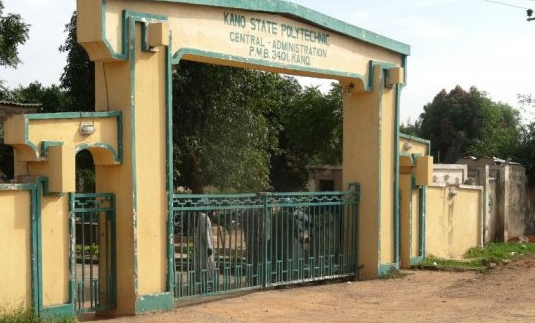Kano, Nigeria — A shocking incident at Kano State Polytechnic has led to the remand of a female student, Khadija Hassan Charanchi, and her lover, Khalid Hussain, in connection with the brutal assault of a lecturer, Aliyu Hamza Abdullahi. The attack, which took place in the lecturer’s office, has raised serious concerns about violence on campuses and the growing influence of thuggery groups in Nigerian educational institutions.
The drama unfolded earlier this week when Charanchi, a student of the polytechnic, invited her boyfriend to meet with her lecturer. She accused the lecturer, Aliyu Hamza Abdullahi, of being an obstacle to her academic progress. According to police reports, Charanchi allegedly felt that Abdullahi had been unfair in his dealings with her, potentially jeopardizing her educational aspirations.
“The situation escalated quickly when the accused, Khadija Charanchi, invited her boyfriend, Khalid Hussain, to the lecturer’s office under the guise of a discussion,” said a police spokesperson. “What seemed to be a routine academic conversation quickly turned violent, with Khalid Hussain reportedly brandishing a cutlass and launching an attack on the lecturer.”
Witnesses at the scene described the chaos that ensued. “It was shocking,” one eyewitness, who wished to remain anonymous, recounted. “The lecturer tried to calm them down, but before anyone could intervene, the boy pulled out a cutlass and struck him. We were all frozen in disbelief.”
The attack left Abdullahi with serious injuries, though authorities have not yet disclosed the full extent of his condition. Fellow staff and students rushed to his aid, immediately notifying security, which led to the swift arrest of Charanchi and Hussain.
The accused appeared before a Shari’a court in Kano, where they were formally arraigned on multiple charges, including conspiracy to commit a crime, belonging to a thuggery group, trespassing, and attempted homicide. During the court session, both Charanchi and Hussain pleaded not guilty to the charges.
The Court’s Ruling
During their court appearance, the Khadi (judge) of the Shari’a court expressed concerns over the nature of the crime and the growing incidence of campus violence in the region. “This incident is a reminder of the urgent need for stricter controls within our institutions to prevent such violence from spiraling further,” the Khadi remarked.
The court, citing a lack of jurisdiction over some of the more severe charges, decided to remand the accused individuals until the case could be heard again. “Due to the serious nature of the charges and the severity of the injuries sustained by the victim, the court has ordered that the accused be remanded in custody until their next hearing,” the Khadi ruled. The case is scheduled for re-arraignment on February 27, 2025.
Background: Violence and Thuggery in Nigerian Campuses
The attack at Kano State Polytechnic has brought to light the growing concerns over violence and thuggery in Nigerian educational institutions. In recent years, there have been numerous reports of students and groups using violence to settle personal disputes, with some cases involving weapons like knives and cutlasses. Many believe that the influence of certain political and social groups has contributed to the normalization of such behavior on campuses.
A lecturer at Kano State Polytechnic, who spoke under the condition of anonymity, noted that while the institution had previously struggled with student protests and minor altercations, this attack was particularly shocking. “We’ve seen students in heated discussions, but to see one bring a cutlass to the office of a lecturer is truly alarming,” the lecturer said.
The rise of campus violence is not an isolated issue but part of a broader societal challenge in Nigeria. Experts suggest that the growing political instability, coupled with the widespread use of thuggery in elections and other public events, has normalized the idea of solving disputes through force. As a result, many Nigerian students have become more willing to resort to violence, believing it to be a legitimate means of addressing grievances.

